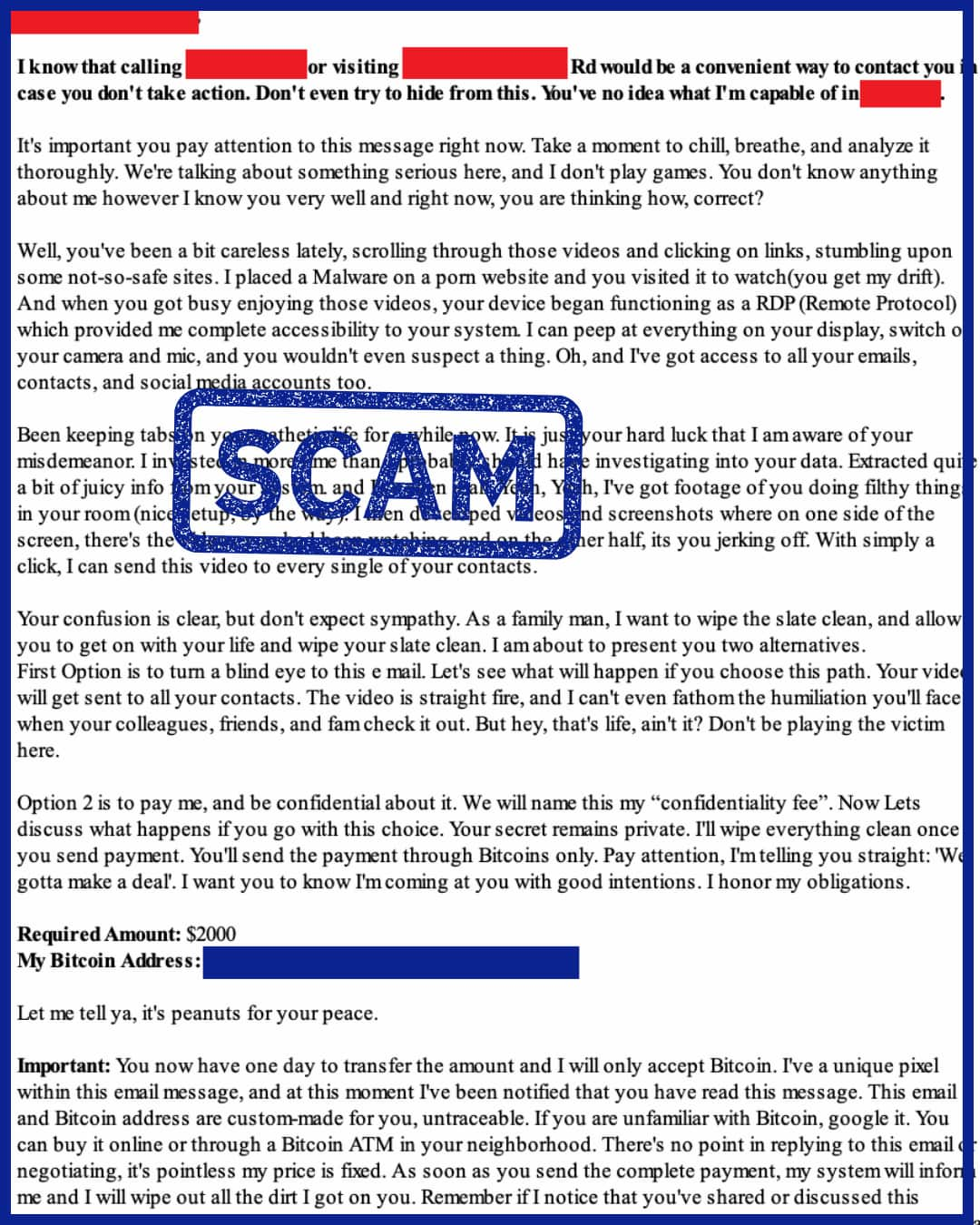Scam alerts website Scamwatch has released a warning that are emailing people and falsely claiming to have and videos hacked from webcams and computers.
Scamwatch, which is run by the Australian Competition and Consumer Commission (ACCC) has said criminals are threatening people by saying they will release the images and videos unless they’re paid.
Scammers will also include personal details such as birth dates and addresses in emails in order to intimidate people into sending money.
The agency said victims are being asked to pay cryptocurrency to a specified address.
Scammers will also include personal detail such as birth dates and addresses in emails in order to intimidate people into sending money. Credit: Australian Competition and Consumer Commission Scam Watch
Scamwatch has assured people that the personal details included in emails are most likely from previous public data breaches and there is “no evidence that the criminals sending these emails really do have access to people’s webcam or computer”.
The website said there have been hundreds of reports of people who have been targeted this way by cyber criminals.
Professor Salil Kanhere, a computer science researcher from the University of New South Wales, told SBS News that these kind of scams can be highly emotive for victims.
“People get scared and they don’t think and they kind of let emotions get the better of then. And then they might start panicking and engaging with that person — and once you engage, it becomes really hard to extract yourself out of that.”
Kanhere said that for many people, there is a lot of personal information readily available online that scammers can use to intimidate or make threats, including images of houses or apartment buildings that have been obtained using the Street View function on Google Maps.
“And then once they target a victim and they receive it, they obviously get alarmed because they wouldn’t expect someone to have a picture of their house. So, they’re basically playing on these emotions,” he said.
Webcam scams
Tricking people into believing they’ve fallen victim to a webcam hack is not a new scam.
David Cook, a cyber security expert from Edith Cowan University wrote in the Conversation in 2020 that “thousands” of spam emails are sent every day to convince users they’ve been caught out by webcams.
Cook also said that these scams generate “considerable ransom success” as victims pay up in fear of being publicly exposed.
Credit: Australian Competition and Consumer Commission Scam Watch
“Most genuine webcam hacks are targeted attacks to gather restricted information,” Cook said.
“They often involve tech-savvy corporate groups carrying out intelligence gathering and covert image capturing.”
‘Camfecting’
However, it is possible for cyber criminals to gain access to webcams.
By downloading malware — programs disguised as legitimate software — people can inadvertently give cyber criminals full remote access to their devices, including webcams.
This process is otherwise known as ‘camfecting’.
In 2018 dozens of Australians fell victim to a scam that involved being secretly filmed by hackers.
The hackers were able to install malware on people’s computers by posing as online support to install tech products.
Videos captured on hacked webcams were then uploaded to YouTube as evidence to convince future targets that threats made against them were legitimate.
However, Kanhere said the process of camfecting has become more difficult in recent years because the latest versions of operating systems alert users about these kind of permissions.
“I think almost all of them will ask you whether you are willing to give permission to this particular app, to the microphone and camera and location services,” he said.
“So it’s a lot harder but it is certainly possible.”
How to protect against webcam scams
In order to prevent these scams from occurring, experts recommend using secure passwords, regularly updating antivirus and operating system software, as well as checking what programs have access to webcams and microphones.
Kanhere recommended avoiding potential malware by never clicking links in emails from unverified sources or installing apps or software from sources other than official websites or app stores.
He also said that users may be able to tell if malware is installed on a device when the battery drains unexpectedly.
Some people will also place a piece of tape over cameras as a simple practice to avoid webcams being compromised.
While Kanhere said that while this can be a good idea, it doesn’t entirely protect users.
“I mean, I personally do that on my laptop, but I’m also aware that that’s not foolproof. There are other ways that malware could be installed.”


